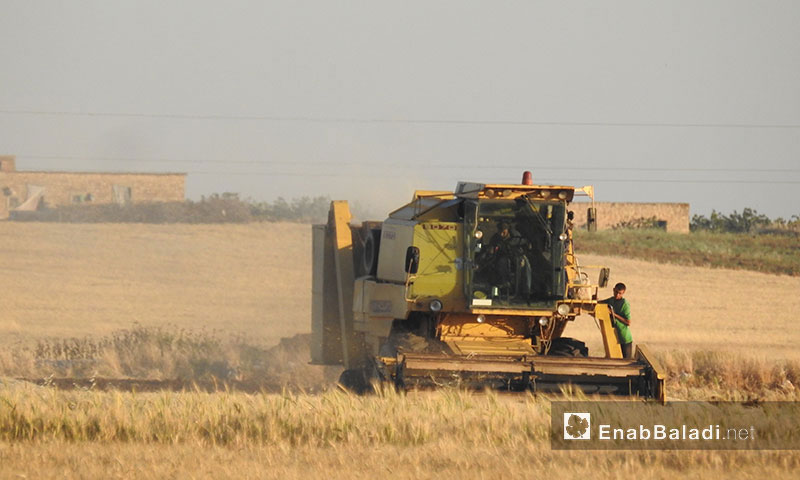



The farmers in Daraa governorate, southern Syria, expect a decrease in the amount of the harvested wheat in the current season, for huge areas of rain-fed lands went out of the production process due to the drought that hit the area last March as a result of rain fail.
This corresponded to “FAB”, a donor organization, cuts of financing allocated to support flour in the area, promising the area’s people a difficult year.
A major percentage of the rain-fed agricultural lands have turned into farms for herding sheep, the Director of Agricultural Department in Daraa Governorate Ibrahim al-Bardan told Enab Baladi.
The director of the Grains Foundation in Daraa Riad al-Rabdawi said that the lack of rain this season, especially in March, has forced large agricultural areas out of the production domain.
Despite the loans offered by the “General Organization for Seed Multiplication” to the contracted farmers in the governorate as to support them and help them in providing the production’s necessities, expectations focus on a potential yield decline.
The last season’s production amount of wheat was estimated by 40 thousand tons, while this year’s harvest might not exceed 20 thousand tons.
The agricultural costs, paid by the farmers who did not benefit from the loans, played a major role in inflating the production’s costs, according the product’s, wheat, prices, as Issa al-A’dnan, a farmer from the city of Daraa, has said, to add that “this year’s wheat yield has costed him an unruly capital, in terms of fuel, fertilizers and seeds, which prices have been on the rise.”
The rain fail came in sync with the donor organization “FAB” statement that it will gradually stop financing the flour project, mid-March, which will negatively affect the prices of both flour and bread in the governorate’s market.
The farmers’ current priority is to sell the yield; Issa al-A’dnan said that it is possible “to sell the yield to the Interim Government, providing that the yield’s value is paid during harvesting; otherwise, the farmers will be compelled to sell it to the black market’s merchants.”
The local councils’ financial impotence and the Interim Government’s delay in buying the yield is indulging the merchants in the black market, where they get into a biding process to buy it from the farmers, to sell it later on to the government of the Syrian regime, which increased the wheat price from 145 to 175 Syrian pounds (each dollar equals about 500 Syrian pounds) this season.
According to the source, the regime’s government is trying to buy the largest amount of wheat so that the local councils and the “Interim Government’s” pumping process would deteriorate in the area’s out of its control, according to which, the Syrian regime’s government would have a full control over the wheat file.
For his turn the Director of the Agricultural Department in Daraa governorate Ibrahim al-Bardan said that the Grains Foundation’s purchase capacity is weak this year, for the regime has increased the prices.
This season, the price of a single ton of wheat is 410 dollars, which is the double of the last year’s price, for a per ton costed 220 dollars, which in turn thrusts the Grains Foundation in a “state of impotence” and inability to purchase this season, according to the al-Bardan’s statement.
Since buying the wheat yield is one of the vital projects, al-Bardan called on the organizations to support the Grains Foundation, as to help it buy wheat this season, especially with gradual flour funding cuts.
He stressed that “FAB’s” decision has negatively affected the flour amounts and the bread prices, pointing out that this will led to a constant rise in the prices of bread in the future.
The director of the agricultural department in the governorate of Daraa pointed out that soft wheat, used in making bread, is not planted in the governorate, and explained that hard wheat alone cannot be used in the manufacturing process, for it has to be mixed with the soft wheat offered by donor entities.
The Director of the Grains Foundation in Daraa Riad al-Rabdawi estimated that the governorate demands 24 thousand tons of wheat every year.
Assistant Minister of Economy in the Interim Government Abdul Hakeem al-Masri told Enab Baladi that the wheat planted in Houran is of the hard type, which is difficult to grind, adding that the governorate does not produce soft wheat.
According to al-Masri, currently, as an experiment, soft wheat has been planted as to provide seeds for the next year; this year’s planted soft wheat might provide the governorate with 40 to 50 tons according to the harvest.
He added that this type of wheat has to be planted in lands different from those where hard wheat is planted, for it demands additional amounts of water.
However, self-reliance on the local harvest will definitely lead to an increase in the prices of bread, which might reach the double or more, to thus form a fresh burden for the citizens, as al-Masri put it.
Approximately, the opposition-held areas in Daraa require an annual amount of wheat that ranges between 24 to 25 tons of flour.
The area’s people lack is triggering the concerned entities and the ones responsible for the area’s affairs to work as hard as possible, in an attempt to reach self-sufficiency and to start projects that provide the life nerve for the least possible prices.
if you think the article contain wrong information or you have additional details Send Correction